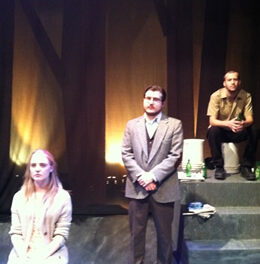John Wustman, “dean of American accompanists,” has been about everywhere and done about everything one can do with a piano. Following a lifetime of accolade-producing work he became a member of the “Center for Advanced Study” of the University of Illinois in 1999; this is the highest honor the university bestows.
In A.J. Fletcher Recital Hall of East Carolina University, he was joined by John Kramar, baritone, and former students Barbara Steinhaus, soprano, and Sharon Munden, mezzo-soprano; all three are equally lauded in the music world. Wustman sustained his effortless and graceful playing at the absolute top of the scale the whole evening. Every note seemed to have meaning, his legato is incredible, and his rhythmic sense, remarkable. Matching this skills, Steinhaus, Munden, and Kramar were impeccable, both in their performance and their stage demeanor.
Kramar’s “…wem, Ohne dich zu dir zu geh’n” from No. 5 of Hugo Wolf’s Spanisches Liederbuch was especially lovely. In No. 7, I particularly noted the piano’s singing bass line. In the duet No. 9, with Kramar and Munden, the diction was superb “vocal coach German.” In No. 10, the piano solo at the end includes a very nice echo effect which Wustman executed with his usual delicacy. Kramar chose to sing No. 16 as a piece of ironic humor. The poem deals with the teasing of the singer’s lover Juana, who always responds to his “today” by stalling and saying, “tomorrow.” At the end he sings,
If she saw me dying of grief
and still heard me sigh “today,”
she would softly say “tomorrow.”
Having sung that, he shrugged his shoulders, arched his eyebrows, and rolled his eyes very expressively. This facial prompting elicited a little laugh from the audience.
All four performers are at the top of their form and famous in their fields, and they performed carefully and with style. They mostly were flawless.
And yet there were serious balance problems between the vocalists and the frequently over-loud piano, even with the lid only slightly open. In addition, the strong German/Wagnerian style expected of those who sing Wolf meant that almost every note was forced and loud. No. 4 had passages that were so loud and stained that they were unintelligible. This is particularly contradictory when the accompanying text is “Quiet the treetops! My child is sleeping.” This well-recognized style requires much study to achieve and seemingly much effort on the part of the performer to sustain. And it is easy to see why Anna Russell had some choice parodies of this type of material (some choice examples of which may be seen at http://www.youtube.com/watch?v=AGpdGTeTVcU).
To sit in a room with this level of sound for an hour is painful; it’s worse than a loud cocktail party or a pneumatic pavement drill. And yet culture mavens sit wisely listening to it and deliver thunderous applause at the end, culminating in the now-obligatory standing ovation.
Again, the performers were excellent, tops in their field. The room was excellent, the piano good. All members of the ensemble were in perfect control and achieving exactly what they intended. But there was nothing pretty about the sound. To paraphrase Franz Sieber [Berlin, 1887], this concert was an example of the “most offensive shrieking, under the extenuating device of ‘dramatic singing,’ with the [audience] much more interested in how loud rather than how beautiful the singing is.”











